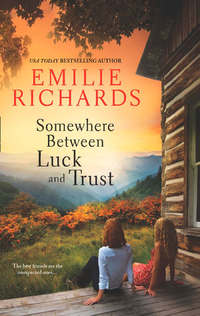
Полная версия
The Color Of Light
Shiloh felt a surge of anger. She answered the unasked question. “Yes, they read. Both of them. My dad should have gone to college, only he had to help support my grandma after my grandpa died, so he quit high school and got a GED. But he’s smart. Really smart. And my mom reads the headlines and does the crossword puzzle every morning, or she did when we could afford the paper.”
“I’m sorry, Shiloh. But a lot of people can’t read. I have a friend, somebody you’d like, who never learned how when she was in school. So I never take reading for granted.”
Shiloh felt a little better. “People think just because we’re homeless, we’re stupid.”
“I can see that’s not true.”
Dougie came barreling out of the bedroom. “I finished!” He skidded to a stop in front of Analiese. “Hi.”
“Hi yourself.” She held up her hand and they slapped palms. “Interested in going to the grocery store with Shiloh and me?”
“Can we get chocolate cereal?”
“Not on my watch.”
Dougie pouted, but only for a moment. “Cookies?”
“Let’s see what they have.”
Shiloh thought going to the store was going to be interesting.
* * *
Analiese was no expert, but she thought if she opened a medical textbook she would find a line drawing of Dougie next to the word hyperactivity. From the moment they’d entered the grocery store, he had raced up and down the aisles, selecting food to put in the cart, then putting it back after Shiloh or Analiese told him to. Not without a fight, of course. He wasn’t passive, but he was surprisingly good-natured, even when he didn’t win, which was always.
Shiloh was a different matter. The girl was riveted on choosing food that would fill her family’s stomachs at the cheapest price. Pasta. Potatoes. Bulk American cheese slices from the dairy case. Analiese watched the girl lift a bag of apples from an endcap, then put it back in place after she considered.
“Okay, you’ve got some staples here,” Analiese said. “Let’s move on to the fresh fruits and vegetables.” She put the apples in the cart. “What else do you like to eat?”
“We mostly eat canned vegetables. Whatever’s available.”
Analiese was sure “available” meant cheap or free at whatever food bank allowed them through the door. “While you’re at the apartment you’ll have a refrigerator. Do you like salads?”
“When we had a garden Mama made salads out of anything that was ready to harvest. Beets, squash, green beans.”
“I dump lettuce in a bowl and maybe a tomato. Let’s get a little of everything that looks good and let her have fun.”
“She doesn’t cook anymore. When there’s a place to cook Daddy does it.”
Every sentence was a reminder of how drastically everything had changed for the family, and as she pushed the cart toward the center of the produce section, Analiese had to be careful not to overreact.
“How about you? Do you like to cook?” she asked Shiloh.
“Mama never let me in the kitchen. I’m not very good.”
“My mother was the same. The kitchen was her domain, and we had to stay out. She still loves to bake. Now that there’s nobody at home to fatten up, she joined a church so she can bake for their Sunday social hours. I don’t think it’s a coincidence they had to start a weight loss group.”
“My mother could use a weight loss group. She says she’s fat because she can’t smoke anymore.”
Analiese considered how best to broach a change of diet. “Let’s get some fresh produce anyway, and I’ll show you what little I know about making a salad. Maybe your mother will help once she’s feeling better.” She stocked the cart with lettuce and other salad vegetables, adding a healthy-enough dressing she used at home.
“Mama’s been sick on and off for a long time,” Shiloh said. “Since before we left South Carolina. After we got there, she helped Aunt Mimi make meals and clean, but she got feeling worse and worse, and pretty soon my aunt had to do everything. Aunt Mimi didn’t like that. And nobody liked Dougie, because he broke things. He’s always fooling around. He can’t sit still.”
As if on cue Dougie arrived again, this time with graham crackers. “Good choice,” Analiese said. “Do you like peanut butter?”
After an emphatic yes she told him which kind to buy and sent him on his way again.
“Do you like broccoli?” Analiese looked closer at Shiloh, who was frowning, and in response she put the broccoli back. “What’s up?”
“This isn’t right, you buying all this food for us. It’s your money, isn’t it? Even if it isn’t, it’s somebody’s money.”
“We make money to spend it. This is the way I want to spend mine.”
“I don’t see why.”
“If I didn’t want to spend money on you, would that make sense? Because for some reason it always seems to. Nobody questions that.”
She could see that Shiloh was working that out, so Analiese did a mini-sermon on the Golden Rule. “Look at it this way. If I were in trouble I would want somebody to help me. I’m just taking my turn.”
“I’m ready to be on the other side, you know? Being helped gets old really quick.”
“I bet.”
Shiloh’s eyes narrowed in suspicion. “How do you know? Have you ever been there?”
“We’ve all needed help from friends or family, and sometimes from strangers.”
“Friends and family, that’s different.”
“Then let’s be friends and this won’t feel so strange.” Analiese picked up the broccoli again. “Some broccoli between friends?”
“That’s weird.”
“I can show you how to cook it.”
“You’re not like any minister I’ve ever known.”
“I’ll consider that a compliment.”
They finished the shopping, adding Dougie’s peanut butter, a package of chicken and another of frozen fish before they checked out. They were in the car heading back to church with an exhausted Dougie napping when Analiese brought up the subject she knew Shiloh would least want to hear.
“Have you thought about school, Shiloh? Because you’re much too smart not to get a good education. And Dougie is, too.”
“We’re homeschooling.”
The girl was trying so hard with so little. She tried to think of a way to say what she was thinking without alienating her, never easy with a young teen.
“We have parents in our church who homeschool their children. I’ve seen it work two ways, Shiloh. One, the family is conscientious and partners with others to offer their children a well-rounded education with the chance to socialize and be involved in sports and other activities. Two, the family just lets their children do whatever they want. The second doesn’t work very well, and those children suffer.”
“I’m not a child.”
“I’m guessing you’re thirteen?”
“Fourteen going on fifteen.”
Answered like a child. Analiese guessed fifteen might be eleven months away. “That means you should be in eighth grade?”
“Ninth. I skipped a grade.”
And these days she was skipping a lot more. Analiese decided it was time to go right to the heart of the bad news.
“You had a difficult time at school in Atlanta. But, Shiloh, you saw how much trouble that caused your parents. So as smart as you are, you must see you have to go to school while you’re in Asheville, and so does your brother. If you don’t, you’ll get them into the same trouble again.”
“I’m not going, and neither is he.”
“It was that bad, huh?”
The sympathy seemed to take her aback. “I hated it.”
“Can you tell me why?”
“I was in gifted classes in Ohio. When we got to South Carolina they said they didn’t have gifted classes unless my parents could pay to have me tested again, and then they put me in with dumb kids because that’s where they had room for me. In Atlanta they looked at my South Carolina records and put me in dumber classes. And the kids were awful.”
Analiese heard two things. One, this girl was so unhappy with the way she had been treated that she was willing to share her story with a stranger. Two, that Shiloh’s self-esteem had suffered and getting her back into school was going to require every bit of skill Analiese possessed.
Actually, there was a third, and she tested her conclusion. “Your parents let you stop going to school?”
“Nobody can make you go if you don’t want to.”
Especially parents who were exhausted, depressed, and otherwise occupied trying to keep their family together.
Analiese gathered her strength for the battle. “Okay, let’s start with the facts. You’re a smart girl. And as a smart girl you know that sometimes the world doesn’t work the way you wish it would.”
“You said it, not me.”
“So that being true, we also know that sometimes you have to do things you don’t want to because the consequences of not doing them are worse than doing them.”
Shiloh obviously knew where this was going. “Not this time.”
“So these are the consequences,” Analiese said. “Just so you’ll know. One, your parents will get into serious trouble with the authorities again. And as a side note to that, I think they’re already worried about the family being split up, and this will only heighten their fears. For good reason.”
She overrode Shiloh’s attempt to interrupt. “And two, the church will not let you stay in the apartment if you don’t go to school. Our leadership won’t court trouble with the authorities.”
“I can pretend to go.”
“No, you can’t.”
Shiloh fell silent.
Analiese let her message sink in before she spoke. “We have good schools in this county, and there are other kids—you’d be surprised how many—who don’t have a permanent address. You won’t be alone, I promise. Asheville’s filled with different kinds of people, and I think you’ll be surprised how comfortably you’ll fit in if you give school a chance.”
“I’ll never fit in anywhere.”
“I know that’s how you feel, but I can guarantee you’re not the only girl your age who feels that way.”
“It’s not just me. They always put Dougie in with the dumb kids because he can’t sit still, and that’s not good for him. He’s not dumb, and he’s not mean, like some boys are.”
“We can talk to the people in charge and tell them everything you’ve been through. They’ll listen.” Analiese hoped it was true.
“Why bother? We won’t be here very long. Daddy isn’t going to find a job.”
“You have a place to live, and we’re going to try to find you a more permanent one. Your mom’s seen a doctor. With those problems out of the way your father can look for work without distractions, and he might find something right away. But you need to go to school so he’ll have even fewer worries, Shiloh. You do get that, right?”
“I hate this.”
Analiese reached over and squeezed her hand. She thought she had won this battle, but probably not the war. Still, the conversation had begun.
chapter nine
FOUR HOURS OF sleep was not enough. Not nearly. But after settling the Fowlers into their temporary home, making calls to parishioners asking for bedding and kitchen supplies, and finally settling down to wrestle with an entirely new sermon, four hours had been all Analiese could manage.
The fact that her computer’s spam filter had logged an automatic response informing her that Isaiah’s email address was no longer valid hadn’t made it easier to sleep, either.
Despite her exhaustion the first and smaller service, which was always more intimate and informal, had gone well enough. A local bluegrass band had provided the music for hymns, and communion in the pews had featured homemade bread supplied by congregation hobby bakers. No one had approached her afterward and asked if she had lost her mind, but no one had really had the opportunity. She had shaken hands at the door, which was never a good place for confrontation, and escaped immediately to her study after the last person filed through. She wasn’t afraid to discuss her decision with her congregation. She just wanted to pick the time and place.
Now sipping a cup of tea as she waited to robe for the second service she stood at her study window. She loved this space with its blue-gray paneling and courtyard view. The courtyard was surrounded by three walls, and the fountain in the center was flanked by concrete benches, where she often sat to write sermons on her laptop.
In some ways the courtyard was a secret garden and rarely used. Today was an exception. Dougie was fishing in the fountain, pants rolled up to his knees and lily pads swishing against his calves as he waded the perimeter with an old stick that flaunted a length of string and most likely an open safety pin. Never mind that there were no fish in the fountain. Dougie, like a modern-day Huck Finn, was determined to live off the land.
The sight might dismay the church building and grounds committee, but she found herself laughing, her first genuine laughter of the day. “Okay, Isaiah,” she said to the empty room. “I get it. You always said God comes to us in disguise. So now She’s a nine-year-old boy with a fishing pole?”
Someone knocked, and she tore herself away from the window, straightened her shoulders, as her laughter evaporated. She crossed the room to what she was sure would be trouble. Instead, when she opened the door she found Ethan, in a sports coat and no tie, and she grabbed his arm and pulled him inside, closing the door behind him.
“I can leave,” he said. “I just wanted to be sure you were okay.”
“How did you know I might not be?”
He just smiled, and she smiled back, warmed by the concern she saw. Having been married to Charlotte, who had been in the thick of every important decision made at the Church of the Covenant, Ethan was no stranger to their politics.
“Yes, I talked about the Fowlers. Thank you for understanding,” she said.
“Do you need anything?”
Anything other than a congregation that realized sometimes being a Christian meant more than giving money and saying the right prayers?
“I might need you to remove a certain young man from the fountain,” she said instead. She nodded toward the window.
He peered around her, then his smile widened. “Seems like a shame, but maybe today’s not the best day for your congregation to see that.”
“Dougie’s one of those kids who could get in trouble in a padded cell.”
“I imagine his parents find it hard to keep up with him, particularly when they have so many other things on their minds. You’ve got people who might be able to help.”
“After this morning we’ll see how much help they want to be.”
“Actually I was thinking about the goddesses. There are lots of different talents among us.”
She heard the “us” for what it was. “It doesn’t insult your masculinity to call yourself a goddess?”
“My masculinity is perfectly secure.”
She touched his arm in affirmation. “Agreed. And now will you take your masculine self outside and remove our little friend from the fountain?”
“I’ll be at the service. Break a leg.” He kissed her cheek and left.
She finished her last swallow of tea and tidied up in the adjoining restroom, where she donned her robe again. By the time she got back neither Ethan nor Dougie was in sight outside. For this service she chose a heavily appliqued stole that Elsbeth, her needleworker sister, had made for her. A collage of colorful figures with hands lifted in prayer was artistically intertwined with flames reaching heavenward and culminating with a magnificent white dove. The stole was her favorite and, as she smoothed it over her robe and matched the edges, she said a prayer. Then she went to meet her congregation at the door of the sanctuary.
Most people knew better than to engage in long conversations as they entered, and she shook hands and greeted those who streamed in for as long as she could. She was about to go to the front when Garrett came through the doorway and motioned her to one side.
“You’re going to tell them about the Fowlers?”
She was gratified he used the family’s name and didn’t simply call them “those homeless people.”
“I plan to, yes. I did in the first service.”
“That’s good, because, you know, the word is getting out.”
“It was never meant to be a secret.”
“Well, no.” He frowned, then he seemed to recover. “And it shouldn’t be. But you know how people talk. They need facts.”
“Which I’ll give them. With a story thrown in.”
He seemed to want to say more but didn’t. She nodded and took advantage of that silent moment to leave.
This more formal service began with a processional of the entire chancel choir from the back of the church into the choir loft, accompanied by the full power of their recently restored pipe organ. Afterward she offered an invocation, more prayers were said, hymns were sung, announcements were made, the offering was taken, and finally the time came for her to speak.
The Church of the Covenant pulpit was itself worthy of a sermon. The imposing granite exterior of the Gothic Revival church was matched inside by elegant timber beams, slippery tile floors, and treasured stained glass windows from the famed Lamb Studios of Greenwich Village. The elaborately carved pulpit had been a gift from an early benefactor, with eight steps so that the pastor could gaze down at his flock to more properly admonish them and remind them of his superior moral status.
Like many churches, the Church of the Covenant also had a lectern, a simple but elegant stand with only a few steps, which, until Analiese had arrived, had been used exclusively by lay readers delivering scripture. One of her first innovations had been to abandon the formal pulpit and deliver most of her sermons from the lectern, which was only as high as it needed to be for the congregation to see her.
Today she settled herself there and looked out over her congregation. Assuming many people had traveled over the holiday she had expected a lower attendance. Instead the polished walnut pews were filled with a respectable number of worshippers. She wondered if news about the Fowlers was already beginning to make the rounds.
As she searched for familiar faces she saw Ethan sitting beside his daughter, Taylor. Taylor was one of the goddesses and not a frequent churchgoer, although lately she had been bringing her daughter, Maddie, to Sunday school and staying for the service herself. Today the man in her life, Adam Pryor, was sitting on her other side.
Georgia Ferguson, another of the goddesses, wasn’t present, although she did attend on occasion. Georgia was most likely with her fiancé, Lucas Ramsey, celebrating the holiday with Lucas’s large extended family in the state she’d been named for.
Seeing Taylor reminded Analiese of what Ethan had said in her study. She hadn’t had time to consider how much and in how many ways the goddesses could help her now, but Georgia was the principal of the Buncombe County Alternative School, and nobody would be a better resource for Shiloh than she would.
She put that out of her mind and leaned forward over the lectern. “Pay close attention to your program this morning. Then set it beside you, because I’m not going to speak on ‘The Politics of Giving Thanks.’ If you spend the next twenty minutes trying to figure out how the message I want you to take home has anything whatsoever to do with that, you’ll be frustrated and annoyed. That’s the last thing I ever want you to feel in this sacred space.”
She heard the small ripple of laughter and felt slightly encouraged. “Instead I want to take you back to another time, to a land where turkey, a native of the Americas, was never on the menu, and the word pilgrims referred to the Israelite people who returned to Jerusalem for the festivals surrounding Passover, Shavuot, and Sukkoth. Let me begin with the Holy Scripture.”
Analiese opened her Bible and began to read the story of the Good Samaritan, but she stopped after a few lines and closed the book. “Let me tell it my way, because this story is timeless, and a little twenty-first century narrative won’t hurt, will it?
“Let’s go back to a certain day in the life of Jesus of Nazareth. As Jesus often did, on this day he was addressing a group who had come to listen to his words and seek guidance.
“It’s no surprise a crowd had gathered. After all, in previous weeks he had built up quite a reputation, catching the attention of King Herod along the way—which was not a particularly good thing, since Herod had already beheaded John the Baptist. Still, Jesus continued with his ministry, knowing it would lead to his death. In Luke, the only gospel where the story of the Good Samaritan is told, we also hear about the miracle of the loaves and fishes, about the healing of a boy possessed by evil spirits, and even a moment when Jesus is transfigured and seen to walk on a mountaintop with Elijah and Moses.
“This day, though, there were no miracles. A man of the law, listening to Jesus, asked what he should do to earn eternal life.”
She paused and smiled. “Now, apparently lawyers in the day of Jesus had much the same reputation, deserved or undeserved, as lawyers today. I’m sure there were jokes making the rounds in the marketplace, jokes like ‘How does a lawyer sleep? First he lies on one side, then the other.’”
She nodded at the laughter and then continued. “Of course there are plenty of jokes about ministers, too. A seminary friend installed hot-air hand dryers in the church restroom, but two weeks later he had to take them out. Somebody had taped a sign on the wall over them that said ‘For a preview of this week’s sermon, push the button.’”
She smiled at their enjoyment of that one. “I promise that today’s sermon is more than hot air, and I do have something important to say. So let’s move back to the scripture. Our lawyer in this ancient crowd was something of a sneaky fellow, and he was anxious to test Jesus. Wanting to get his future signed, sealed and delivered, he asked Jesus what he had to do to inherit eternal life.”
She looked out and raised a finger. “Well, be honest, isn’t that what you would have asked?” She waved her hand. “Here was your chance to have the entire purpose of existence laid out in front of you. But Jesus never gave simple answers. Instead he asked the lawyer for his own opinion, and the man said that he was required to love God with all his heart, soul and might, and also love his neighbor as himself.
“Jesus agreed he was correct, so therefore he needed to go and do exactly that.”
She paused. “Would you have known what to do?”
She watched for heads nodding or shaking before she moved on. “Maybe that would have been the end if the lawyer hadn’t been such an inquiring sort, but then he stuck it to Jesus, which I think was his intention all along. He asked exactly who Jesus would consider to be his neighbor. Do you know what you would have said?”
Again she paused, wanting them to really think about their answers. “My neighbor is everyone who lives beside, behind and in front of me? Or possibly your definition would be broader. Your neighbor is everyone on your street, or in your life, perhaps even, if you’re feeling really generous, some people you don’t like.”
She waited a moment, then went on. “Jesus loved to tell stories, so in answer he replied by telling the now-familiar tale of a man who, after leaving Jerusalem to head to Jericho, was attacked and robbed by thieves and left bleeding by the roadside. The story doesn’t actually say this man was a Jew, although I think perhaps that was assumed. We do, however, know what happened to him.
“As our traveler lay there, in the worst possible need of assistance, a priest passed by, perhaps, like me, somebody charged with the spiritual health of his followers. Do you think the priest stopped to assist the traveler?”
She waited for the shaking of heads. “Sadly no. Instead he crossed the road, in a hurry to get somewhere else and most likely a bit afraid that if he did stop, he might be courting trouble. Maybe he had a council meeting or a crisis that seemed more important. And who wants to court trouble when it’s easier just to continue on our way?”







